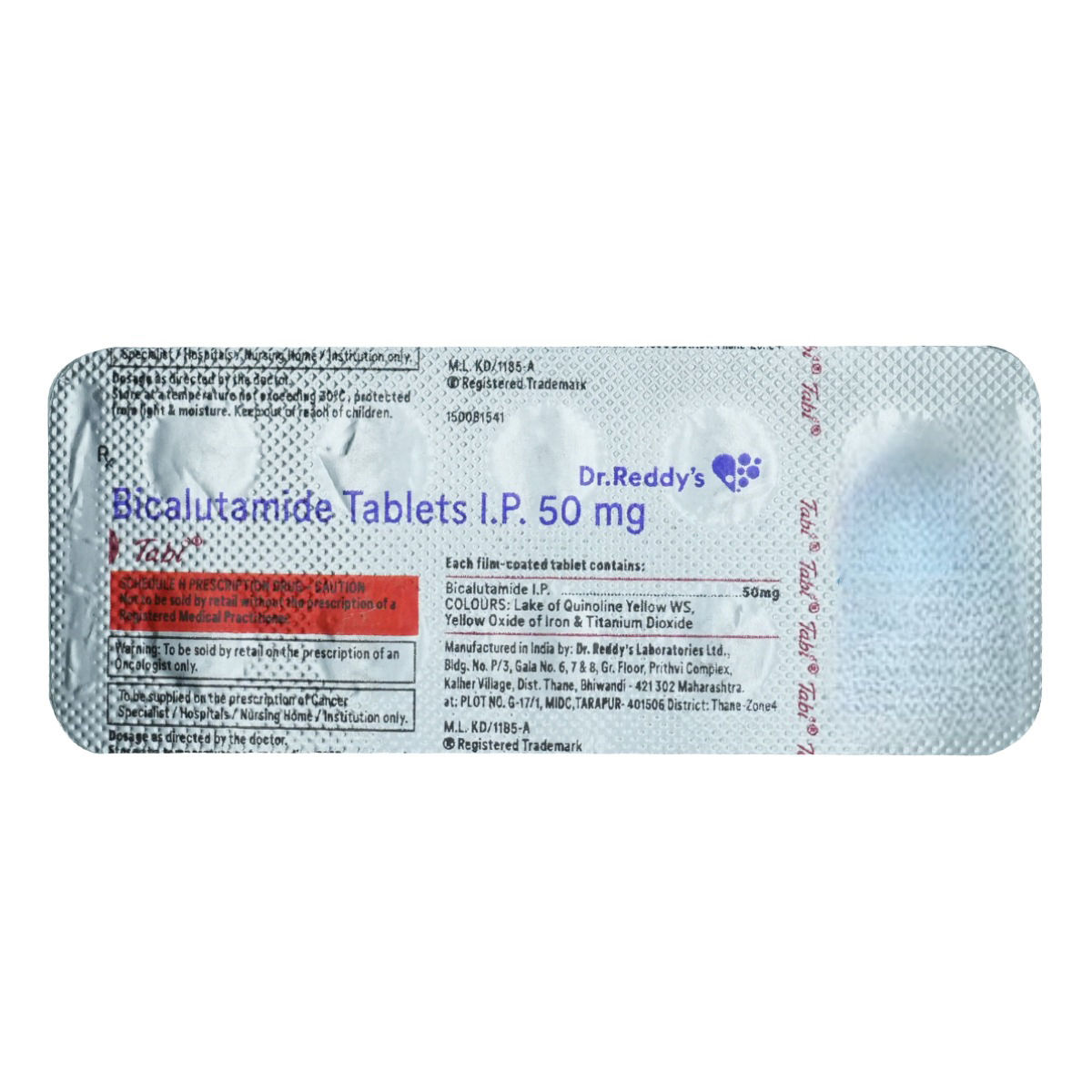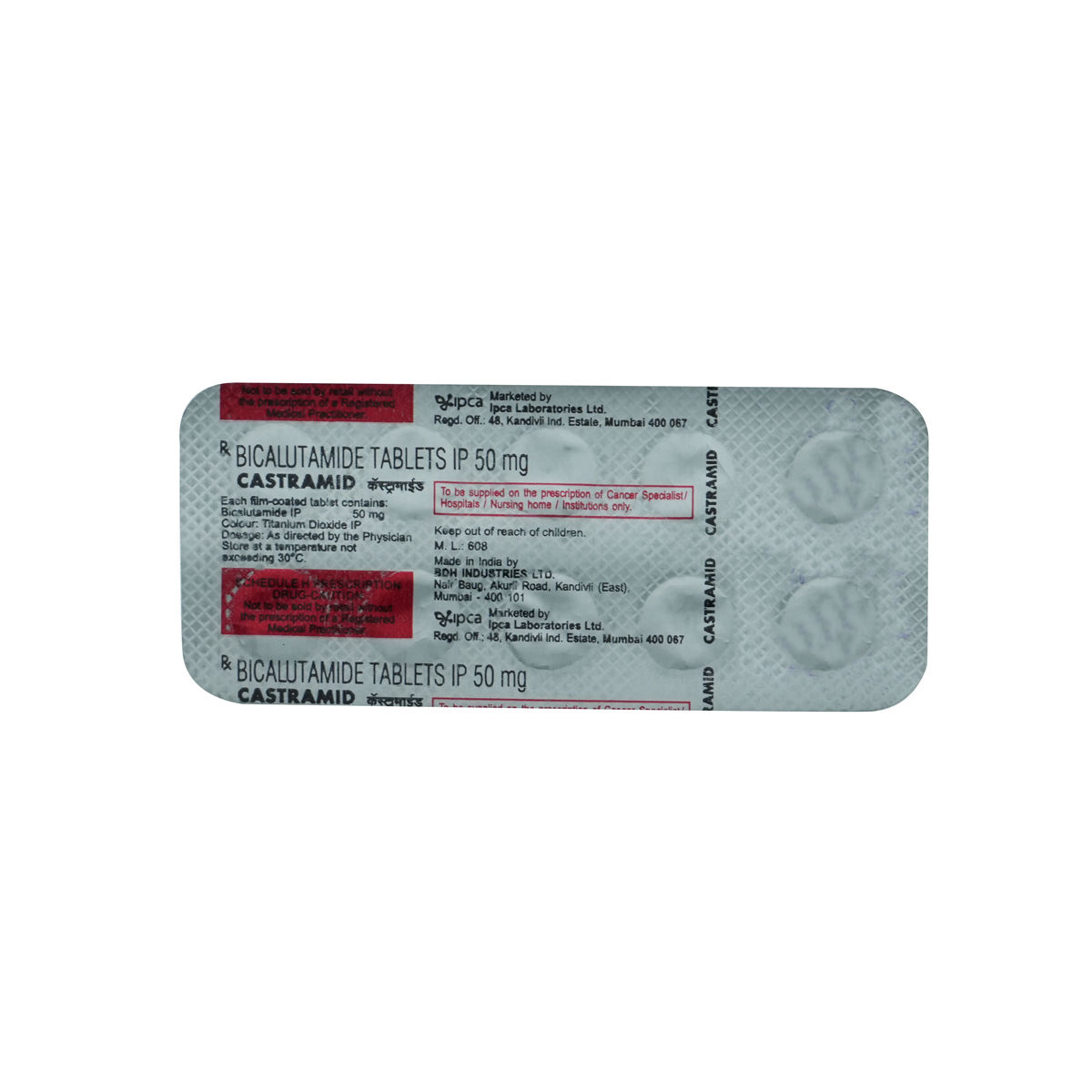Bicalutamide
About Bicalutamide
Bicalutamide is used to treat prostate cancer. Prostate cancer is prostate gland cancer (a small gland under the bladder that produces semen) found only in men. The symptoms include difficulty in urination, pain, numbness, or sexual problems.
Bicalutamide contains Bicalutamide, which works by inhibiting the effects of androgens (male hormones) such as testosterone that increase the growth of prostate cancer cells. Bicalutamide prevents testosterone from binding to androgen receptors on the prostate cancer cells and starves cancer cells of testosterone. Thereby, it prevents the growth of prostate cancer cells and eventually shrinks the prostate tumor.
Take Bicalutamide with or without food as advised by your doctor and swallow whole with a glass of water. Do not crush, chew or break it. Your doctor will advise you on how often you take your tablets based on your medical condition. In some cases, you may experience weakness, skin rash, swelling and tenderness of the breast, nausea, dry skin, weight gain, hair loss, hot flushes (sudden feeling of warmth), anemia (lack of blood), reduces sex drive, constipation, depression, indigestion or dizziness. Most of these side effects of Bicalutamide do not require medical attention and gradually resolve over time. However, if the side effects persist or worsen, please consult your doctor.
If you are allergic to Bicalutamide or any other medicines, please tell your doctor. Bicalutamide is not recommended for women and children. Please consult a doctor if you are pregnant or breastfeeding before taking Bicalutamide. Please consult a doctor if you want to father a child before taking Bicalutamide as it may impair fertility in men. Avoid taking Bicalutamide with cisapride, astemizole, or terfenadine. Avoid direct exposure to excessive UV light or sunlight and wear protective clothing while going out in the sun as Bicalutamide may increase sunburn risk. If you have diabetes, liver, or heart problems, inform your doctor before taking Bicalutamide.
Uses of Bicalutamide
Medicinal Benefits
Bicalutamide contains Bicalutamide, an anticancer drug used in the treatment of prostate cancer. Bicalutamide works by inhibiting the effects of androgens (male hormones), such as testosterone, that increase the growth of prostate cancer cells. Bicalutamide prevents testosterone from binding to androgen receptors on the prostate cancer cells and starves cancer cells of testosterone. Thereby, it prevents the growth of prostate cancer cells and eventually shrinks the prostate tumor. Also, Bicalutamide relieves difficulty in urination. Bicalutamide can be used in combination with radiation therapy to treat prostate cancer, where cancer has spread from the prostate gland to the surrounding tissues.
Directions for Use
Storage
Side Effects of Bicalutamide
- Weakness
- Skin rash
- Swelling and tenderness of breast
- Nausea
- Dry skin
- Weight gain
- Hair loss
- Hot flushes (sudden feeling of warmth)
- Anaemia (lack of blood)
- Reduced sex drive
- Constipation
- Depression
- Indigestion
- Dizziness
Drug Warnings
If you are allergic to Bicalutamide or any other medicines, please tell your doctor. Bicalutamide is not recommended for women and children. Please consult a doctor if you are pregnant or breastfeeding before taking Bicalutamide. You and your partner recommend using effective birth control measures while taking Bicalutamide and for 130 days after discontinuing Bicalutamide. Please consult a doctor if you want to father a child before taking Bicalutamide as it may impair fertility in men. You are advised to quit smoking as it may increase the risk of prostate cancer. Avoid taking Bicalutamide with cisapride, astemizole, or terfenadine. Regular tests are recommended to monitor liver function and if there is any severe disturbance in liver functioning, avoid taking Bicalutamide. Avoid direct exposure to excessive UV light or sunlight and wear protective clothing while going out in the sun as Bicalutamide may increase sunburn risk. If you have diabetes, liver, or heart problems, inform your doctor before taking Bicalutamide.
Drug Interactions
Drug-Drug Interactions: Bicalutamide may have interaction with medicine for stomach disorders (cisapride), anti-allergic drugs (astemizole, terfenadine), heart-related drugs (procainamide, amiodarone, sotalol, quinidine), antibiotic (moxifloxacin), opioid painkiller (methadone), blood thinner (warfarin), immunosuppressant (ciclosporin), antacid (cimetidine), antifungal (ketoconazole).
Drug-Food Interactions: Bicalutamide may interact with grapefruit juice. Therefore, avoid intake of grapefruit juice with Bicalutamide as it may increase concentrations of Bicalutamide and cause more adverse effects.
Drug-Disease Interactions: If you have diabetes, liver or heart problems, inform your doctor before taking Bicalutamide.
Drug-Drug Interactions Checker List:
Safety Advice

Alcohol
cautionInteraction of Bicalutamide with alcohol is unknown. Please consult a doctor before consuming alcohol while using Bicalutamide.

Pregnancy
unsafeBicalutamide is contraindicated in pregnant women as it is not approved for use in women. Please consult a doctor if you are pregnant or planning for pregnancy.

Breast Feeding
unsafeBicalutamide is contraindicated in breastfeeding women as it is not approved for use in women. Please consult a doctor if you are breastfeeding.

Driving
cautionBicalutamide may cause drowsiness in some people. Therefore, avoid driving if you are drowsy after taking Bicalutamide.

Liver
cautionTake Bicalutamide with caution, especially if you have a history of Liver diseases/conditions. The dose may be adjusted by your doctor as required.

Kidney
safe if prescribedBicalutamide is safe to use in patients with kidney problems if prescribed by a doctor.

Children
unsafeBicalutamide is not recommended for children as the safety and effectiveness were not established.
Habit Forming
Diet & Lifestyle Advise
Include fish, soy, tomatoes, Brussels sprouts, kale, broccoli and oils containing omega-3 fatty acids such as olive oil as these foods may reduce the risk of prostate cancer.
Avoid grilled meat, red meat, saturated fat found in animal products, milk and dairy products as they may increase prostate cancer risk.
Exercise regularly to lose weight as obesity is also considered as a risk factor for prostate cancer.
Quit smoking to reduce the risk of prostate cancer.
Special Advise
Regular blood tests are recommended to monitor changes in blood and liver functioning while taking Bicalutamide.
Patients Concern
Disease/Condition Glossary
Prostate cancer: It is prostate gland cancer (a small gland under the bladder that produces semen) found only in men. The symptoms include difficulty in urination, pain, numbness, or sexual problems. It is the most common type of cancer in men. The cause of prostate cancer is unknown and may be caused due to exposure to certain chemicals or family history. There are certain factors that increase the risk of prostate cancer, such as a family history of prostate cancer, older age, obesity, or genetic changes.
FAQs
Bicalutamide is used to treat prostate cancer.
Bicalutamide contains Bicalutamide, an anticancer drug that works by inhibiting the effects of androgens (male hormones) such as testosterone and reduces or prevents the growth of prostate cancer cells and eventually shrink the prostate tumour.
You are not recommended to take Bicalutamide with anti-allergic drugs such as terfenadine or astemizole. It may increase the levels of terfenadine or astemizole in blood and cause adverse effects as severe irregular heartbeat. However, please consult a doctor before taking Bicalutamide with other medicines.
Bicalutamide may cause infertility or a period of subfertility (delay in conceiving) in men. Therefore, if you want to father a child, please discuss with your doctor before taking Bicalutamide.
Bicalutamide should be used with caution in diabetic patients as it may increase the risk of high blood sugar levels. Therefore, regular monitoring of blood sugar levels is recommended while taking Bicalutamide and inform your doctor if you have diabetes before taking Bicalutamide.
Bicalutamide is not recommended for patients suffering from heart rhythm problems such as arrhythmia (irregular heartbeat) as it may increase the risk of heart rhythm problems. Therefore, inform your doctor if you have any heart problems before taking Bicalutamide.
Bicalutamide increase skin sensitivity to the sun and make sunburn more easily. Therefore, avoid direct exposure to excessive UV-light or sunlight, wear protective clothing and use a sunscreen while going out in the sun.
While taking Bicalutamide, avoid certain things to ensure your safety. Don't take other medicines like cisapride, astemizole, or terfenadine, as they may interact with Bicalutamide. Also, limit your sun exposure and wear protective clothing, as Bicalutamide may increase sunburn risk. If you're pregnant, breastfeeding, or planning to father a child, consult your doctor before taking Bicalutamide. Additionally, inform your doctor if you have diabetes, liver, or heart problems, as they may need to monitor you closely. By avoiding these things, you can use Bicalutamide safely and effectively.
Bicalutamide is a medication used to treat prostate cancer, but it is not a traditional form of chemotherapy. Chemotherapy typically involves drugs that directly kill cancer cells. Bicalutamide, on the other hand, is an anti-androgen medication that works by blocking the effects of male hormones (androgens) that fuel prostate cancer growth.
Yes, Bicalutamide may cause hair loss as a side effect. Hair loss is a common side effect of bicalutamide. In most cases, it is mild to moderate, but in rare cases, it can be more severe.
Bicalutamide is used to treat prostate cancer. Prostate cancer is prostate gland cancer (a small gland under the bladder that produces semen) found only in men. The symptoms include difficulty in urination, pain, numbness, or sexual problems.
Take Bicalutamide as directed by your healthcare provider, usually once a day, at the same time each day, to maintain consistent levels of the medication in your body. Swallow the tablet whole with water, with or without food. Don't chew or break the tablet. These steps will help you take your medication correctly and ensure it works effectively. If you have any questions, ask your healthcare provider for guidance.
Diarrhea is a possible side effect that may occur while using Bicalutamide in some cases. It may vary from person to person. If it happens and persists, please consult your doctor and seek appropriate treatment. Do not take any antidiarrheal medications on your own.
The exact duration of taking Bicalutamide will be determined by your doctor, based on your specific health needs and treatment goals. This medication is primarily used to treat prostate cancer, and the treatment period can vary significantly from person to person - ranging from several months to several years. To ensure the best possible outcome and effectively manage your condition, following your doctor's advice and taking the medication for the full recommended duration is essential. Don't stop taking the medication without consulting your doctor first, even if you start feeling better or experience side effects.
Common side effects of Bicalutamide may include weakness, skin rash, swelling and tenderness of the breast, nausea, dry skin, weight gain, hair loss, hot flushes (sudden feeling of warmth), anaemia (lack of blood), reduced sex drive, constipation, depression, indigestion or dizziness. Most of these side effects of Bicalutamide do not require medical attention and gradually resolve over time. However, if the side effects persist or worsen, please consult your doctor.
Inform your doctor about all your medications, as some may interact with Bicalutamide. Do not club any other medicines with Bicalutamide unless prescribed by the doctor.
Bicalutamide is not intended for use by women or children.
Seek immediate medical attention, as these may be symptoms of a serious lung problem.
Abdominal pain is the most common side effect of Bicalutamide. It usually does not require medical care and resolves on its own over time. However, if it persists or worsens, contact your doctor.
Before using this medication, you should inform your doctor about your medical history, including any ongoing medicines, to avoid potential interactions and minimize side effects.
Take the missed dose as soon as you remember unless it's almost time for your next dose. In this case, skip the missed dose and take your next dose at the regular time. Never take a double dose to make up for a missed one.
Avoid consuming alcohol altogether while taking Bicalutamide. Alcohol can increase the risk of liver problems, which is a serious side effect. To ensure your safety and well-being, it's best to abstain from alcohol completely during your treatment. Consult your doctor if you have any questions or concerns.






